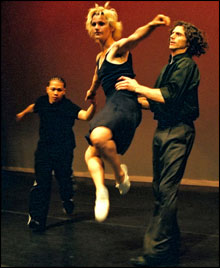 It’s the time of year when you swear you’re going to finish all those special projects you started and clean out the files and scour the closets of junk you never wear. The job always peters out before you’re done. Chances are, the clutter turns out to be so drenched in memory and forgetfulness that, instead of being miscellaneous objects, the bits have become tokens. They remind you of your life, and you can’t quite dispense with them. Everett Dance Theatre has found a way to put its past to use, with its performance piece Home Movies. Presented by CRASHarts at Zero Arrow Theatre last weekend, the piece is as personal as its title implies, and as risky.
It’s the time of year when you swear you’re going to finish all those special projects you started and clean out the files and scour the closets of junk you never wear. The job always peters out before you’re done. Chances are, the clutter turns out to be so drenched in memory and forgetfulness that, instead of being miscellaneous objects, the bits have become tokens. They remind you of your life, and you can’t quite dispense with them. Everett Dance Theatre has found a way to put its past to use, with its performance piece Home Movies. Presented by CRASHarts at Zero Arrow Theatre last weekend, the piece is as personal as its title implies, and as risky.
Home Movies is a collage of talk, movement, music, and visuals, and it counts on an audience that loves real-life stories, both exceptional and mundane. The five performers relate short anecdotes on various themes — embarrassing moments in grammar school, family holidays, the worst jobs they ever had — in front of projected snapshots, amateur footage, and artful visuals by Owen Muir.
The technique is intentionally fragmented. No one’s story gets told all at once, and the tempo is jumpy. Unrelated pieces of music butt against one another. Screens roll up an down in different parts of the space. One person’s motif triggers the memories of someone else. Recollected incidents get left unfinished, as if too painful to remember. People sometimes interrupt each other, or move in the background like a Greek chorus. They create a kind of collective biography, a scrapbook, but not a beginning-to-end story.
Eventually, you come to know the performers a little. Aaron Jungels (director of the piece, with Dorothy Jungels) seems to have had a pretty all-American childhood — reckless bike trips, summers by the beach, mischief involving defenseless animals. Marvin Novogrodski, whose Polish grandparents came to America after a harrowing flight from the Nazis, remembers Jewish celebrations and hints at a previous, fringy show-biz career. Rachael Jungels took modern dance at Juilliard, but not before engaging in a liaison with a pimp.
Bravell Gracia Smith grew up in a rough neighborhood where he watched transvestites coming out of a local whorehouse and learned to deal with the local mob. Sokeo Ros’s parents escaped the Khmer Rouge in the Cambodian terror; he was born in a refugee camp, but once the family got to America, they wanted him to get a respectable job and settle down.
I couldn’t altogether track these specifics; probably I wasn’t meant to. The piece was more about experiences we all suffer through. About the expectations our fathers had for us and the escapades we concocted as kids. The cloudless days, the frightening mean streets, and the bewilderment when our relatives suddenly hated one another.
The Everett performing style is extremely low-key, and the movement portions look underdone: stereotyped striptease moves, somersaults, languid chorus lines and a few choreographic phrases. The four men lift Rachael Jungels overhead as she stretches out flat. There’s a half-hearted synchronized-folding-chair routine. It all passes quickly and fades into the next thing.
The day after the performance, I remembered the initial set of slides depicting the four houses where the performers grew up. Wait. Four? But there were five actors. Aaron and Rachael Jungels are brother and sister. (Dorothy is their mother.) So did they live in the same house? The performance didn’t acknowledge their relationship. Neither, as a matter of fact, did they or their partners really respond to one another’s stories or interact conversationally. Instead, their focus was on the audience. Which puts more than a slight spin on the intimacy of the material.
After the death of fathers and the torturous resolution of careers, they all came forward in farewell and the soundtrack played Louis Armstrong’s "Wonderful World." Ironically, I assumed. Not one of them could possibly have had it all that sweet.
___
On the Web:
Everett Dance Theatre: //www.everettdancetheatre.org